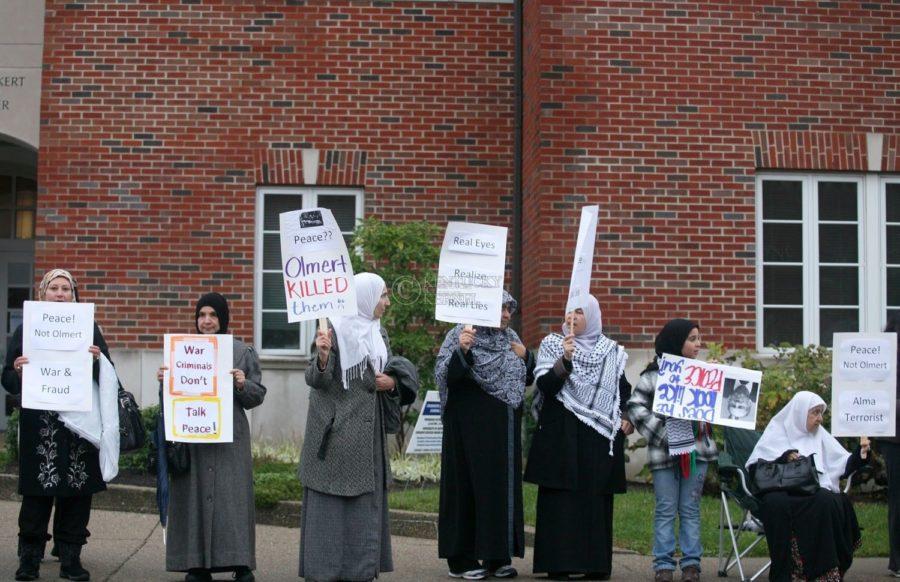Sparking controversy: Security, protest heightened for arrival of former Israeli prime minister
October 15, 2009
Rose Avenue paralleled the divide between Israel and Palestine Wednesday evening with the arrival of Israel’s former prime minister Ehud Olmert.
Keffiyeh scarves and Palestinian flags signaled the passionate opposition to Olmert, while a flood of students, faculty and community members came to hear his speech intended to promote peace in the Middle East.
Upon entering the Singletary Center for the Arts, three rows of security inspectors lined the doors checking bags and coats. Inside, two to three security officers stood at every door, with Olmert’s own security personnel at his side.
Before Olmert could complete an opening statement, Palestinian supporters throughout the crowded auditorium shouted comments, such as “shame on you†and “baby killer†to the former Israeli official.
Olmert’s speech was part of the university’s incentives to incite a global dialogue on peace between the two Middle Eastern states.
“We have to expose our students to global newsmakers,†said UK President Lee Todd to open the event.
After a few minutes’ pause, Olmert began his lecture directed toward the protesting of some of the audience members.
“If one knows something about Israeli politics, this is part of our lives,†Olmert said. “I hope they will also be patient enough to listen, they might hear something they don’t know.â€
The Islamic Society of Central Kentucky, led by Khalad Ghoneim, initiated the Palestinian protests, with a two-pronged message.
“First, we applaud the initiatives for a peace house discussion,†Ghoneim said. “However, we believe the choice of Ehud was not the proper choice.â€
In Olmert’s speech, he attempted to explain his advocation of the killing of civilians on the grounds of terrorism by connecting them to a conversation with President Barack Obama.
“When you find terrorists are shooting from houses of civilians, what do you do?†Olmert asked the audience.
Olmert asked the same question to the then-junior senator from Illinois while he visited the former prime minister’s home.
“I asked him what would be your reaction (to the shootings). He said, ‘If someone would shoot into the place where my two daughters are, and would endanger their lives, I would do everything in my power to destroy them.’ â€
In his speech, Olmert directed attention to Iran as a nuclear threat.
“There is only one leader in the world who openly, proudly and officially declared that he wants to liquidate another country,†he said.
Olmert said dialogue with Iran “will not be effective†and waiting a year to address this issue will be “too late.â€
At the end of his lecture, Olmert received a barrage of questions directed at the allegations of the murder of Palestinian civilians.
“We were attacked for 40 years by terrorists from the north and invaded on a daily basis by terrorists from the south,†Olmert said. “It was not an invention created by Jews, it was created, performed and carried out by Arabs.â€
After this comment, screams and protests erupted from the audience and several women were escorted from the Singletary Center.
Islamic Society of Central Kentucky board representative for the Muslim Student Association, Heba Suleiman, contributed to the protest and attended the lecture.
“Everything that he says is just wrong,†Suleiman said.
Journalism and political science freshman Drew Teague felt differently.
“With all the commotion going on, it made for a very interesting debate,†Teague said. “He was very passionate about his cause and that helps a lot when you’re in those kinds of situations and can stand your ground against the people against him.â€
Olmert closed his lecture with a statement on the future for peace.
“We want to live here not at the expense of others, but alongside others, in peace, in mutual respect, in justice,†Olmert said. “I am certain it will happen sooner than most people think.â€
































































































































































